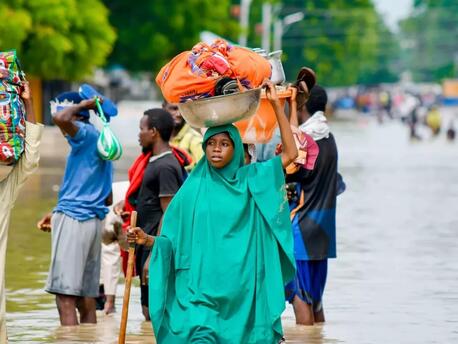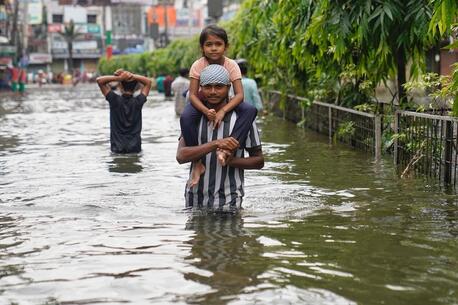A Mother and Daughter Return to Learning in Pakistan
Through an accelerated learning program delivered by UNICEF with funding from Education Cannot Wait, 12-year-old Muqadas and her mom are back in school in one of Punjab's flood-affected districts.
The 2022 floods damaged or destroyed 30,000 schools and put education on hold for millions of children
When she was growing up, there was no elementary school in Salma Qadeer’s remote village in Pakistan. “After fifth grade, I could not study further, and my parents married me off,” says Salma. “Even after marriage, I wanted to get an education, but there was no opportunity as I had to take care of the family, and there was no learning center or school for people of my age.”
Now 35, Salma is the proud mother of five children. She never gave up on her dream of an education – and never gave up on her hope of ensuring her own daughter, Muqadas Zahra, 12, could continue her schooling beyond the fifth grade.
But history has a way of repeating itself. When floods ripped through Pakistan in 2022 — a nationwide disaster that submerged over one-third of the country, damaging or destroying 30,000 schools — education was put on hold for millions of girls like Muqadas.
I could not study for almost a year. I stayed home helping my mother with household chores but missed school a lot. — Muqadas, 12
“After completing fifth grade, I lost hope for studying further as there was no elementary school for girls in our village or the nearby areas,” says Muqadas. “My parents are poor and couldn’t afford to send me to the city for further education. I could not study for almost a year. I stayed home helping my mother with household chores but missed school a lot."
Luckily for Muqadas, there is shelter in the storm. Through an innovative flood response program delivered by UNICEF with funding from Education Cannot Wait (ECW), the global fund for education in emergencies, accelerated learning programs are being put in place to get girls and boys back to learning across Pakistan.
The fast-acting program has supported more than 100,000 children by establishing temporary shelters, generating alternate learning pathways and rehabilitating schools. Delivered through a consortium of partners including UNICEF, the Agency for Technical Cooperation and Development (ACTED), and the International Rescue Committee, the ECW investment is also providing mental health and psychosocial support and life-skills training to ensure a smooth transition for girls and boys who were pushed out of schooling by the floods — and still others who had never entered the classroom at all.
Accelerated learning programs allow students to complete middle school in less than 20 months
With the support of the investment, Muqadas has managed to make it back to the classroom. And in a remarkable twist of fate, her mother is attending classes with her.
“I am so excited to be back in school,” says Muqadas. “I am in grade 6 and hope to go to college and become a doctor one day.”
The accelerated learning programs provide children like Muqadas (and even a few adults like Salma) with the opportunity to complete middle school in just 20 months. In all, there are 40 students in their class. The program got its start from humble roots, with ad hoc classes delivered in Muqadas’ home. Since then, it has been relocated to a nearby primary school.
“I couldn’t imagine that I would ever enroll in a school again, along with my daughter. When I saw young girls studying in the accelerated learning program at our home, my interest renewed,” says Salma. “I discussed this with the teacher in the center who encouraged me to get registered. We, as a family, decided that Muqadas and I should both join the center. I feel good about coming to school with my daughter. My teacher Ayesha encourages me, and Muqadas also helps me with homework.”
Smart investments in resilient infrastructure and proactive risk management strategies will help schools stay open when climate crises hit
In all, there are anywhere from 20 million to 22 million children out of school in Pakistan. About 12 million are girls, according to the World Bank. And while enrollment has increased by about 10 percent over the past 14 years, about 75 percent of 10-year-olds can’t read a simple text. The learning deficit only increased with COVID-19, the floods of 2022 and recent flooding in Sindh Province, which affected the learning of 230,000 children and damaged more than 1,300 schools.
ECW and its strategic partners are piloting anticipatory action in response to the climate crisis in places like Pakistan. At this year’s UN General Assembly, ECW announced a $2.5 million grant to UNICEF to pilot anticipatory actions across six districts in Pakistan that are highly vulnerable to flooding.
The investment seeks to reduce disruption to learning for children and their communities during riverine floods, reduce drop-out rates and minimize damage to schools by investing in resilient infrastructure and proactive risk management strategies.
Building back better helps children stay in school
Together with other initiatives, this fast-acting relief is providing a foundation to build back better from the floods, and ensure that next time floods hit, girls like Muqadas will not be pushed out of school.
“If this center had not been established, I would have lost the opportunity to learn beyond fifth grade,” says Muqadas.
Not only the young girls, but even married women want to learn. I want all my children to be educated so that they don’t have to do menial jobs and can progress in life. — Salma, mother of five
Muqadas and her mother are thriving in the new learning environment, which features accelerated classes in math, Urdu, English and a variety of other subjects.
“Not only the young girls, but even married women want to learn,” says Salma. “I want all my children to be educated so that they don’t have to do menial jobs and can progress in life.”
Learn more about UNICEF's work for children in Pakistan.
Every child has the right to a quality education. UNICEF works with partners around the world to help children learn. Please donate today.
HOW TO HELP
There are many ways to make a difference
War, famine, poverty, natural disasters — threats to the world's children keep coming. But UNICEF won't stop working to keep children healthy and safe.
UNICEF works in over 190 countries and territories — more places than any other children's organization. UNICEF has the world's largest humanitarian warehouse and, when disaster strikes, can get supplies almost anywhere within 72 hours. Constantly innovating, always advocating for a better world for children, UNICEF works to ensure that every child can grow up healthy, educated, protected and respected.
Would you like to help give all children the opportunity to reach their full potential? There are many ways to get involved.




